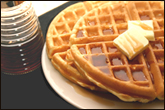Dear Umbra,
I saw at the store there is “organic” maple syrup. Is there really a difference between organic and non-organic maple syrup? Do conventional farms spray the trees with massive amounts of pesticides? I don’t have much money (poor college student) so I was just trying to buy organic for things like apples and milk, which I’ve heard should only be bought in organic form.
Brianna
Farmington Hills, Mich.
Dearest Brianna,

Good to the last drop.
You’ll never hear me saying anything negative about maple syrup (except maybe “it’s all gone”).
The U.S. Department of Agriculture currently regulates use of the “organic” label, but this is a recent development. When the organic industry demonstrated remarkable economic growth during the 1990s, the feds decided they should step in and standardize the various state and independent certification requirements. The organic label is an actual label and affirms that producers have adhered to certain guidelines (and paid a certification fee). I provide these details in order to differentiate the organic label from simple advertising claims such as “natural” or “free range,” which are, for all intents and purposes, meaningless, and to point out that a producer must be willing and able to pay a fee in order to gain the federal label. In your fair state of Michigan, ranked seventh in U.S. maple syrup production, you may well buy syrup from small sugar houses that use sustainable practices but don’t produce enough sweet liquor to make organic certification fees economical.
You probably know that syrup is gathered through small holes drilled in maple trees. It falls under the “wild-crop harvesting” section of the National Organic Standards, which states in part, “A wild crop must be harvested in a manner that ensures that such harvesting or gathering will not be destructive to the environment …” In an organic sugar bush, as in any organic system, additives are strictly regulated and synthetic chemicals are generally not allowed. Organic certifiers ask producers how they control rodents, whether they spray pesticides on trees, and whether chemicals are used to keep tap holes open. Sap transforms to syrup over hours in a boiling, foaming evaporator; organic producers are prohibited from using certain chemicals to reduce foaming. Most of them use allowable, traditional de-foaming agents instead: butter or oil. (Sorry, vegans.) The federal organic rules don’t include any standards specific to maple syrup, but best practices call for organic producers to refrain from over-tapping or overburdening trees — for example, by tapping trees only of a certain diameter or greater.
So the answer to the first half of your question is yes: There can be important differences between organically labeled syrup and unlabeled syrup. Then there’s the other half of your question — whether that difference is vital enough to merit burdening your student budget. I don’t think it is. Unless you’re mainlining syrup. I would continue to prioritize fruits and vegetables, which should make up the bulk of your diet and hence warrant organic attention. Check out this handy shopper’s guide, which lists high- and low-pesticide crops so you can see at a glance which fruits and vegetables are most important to buy organic. Keep eating syrup, and if you buy direct from small producers, I’m sure they’ll be happy to answer any questions you have about their production techniques.
Sweetly,
Umbra


